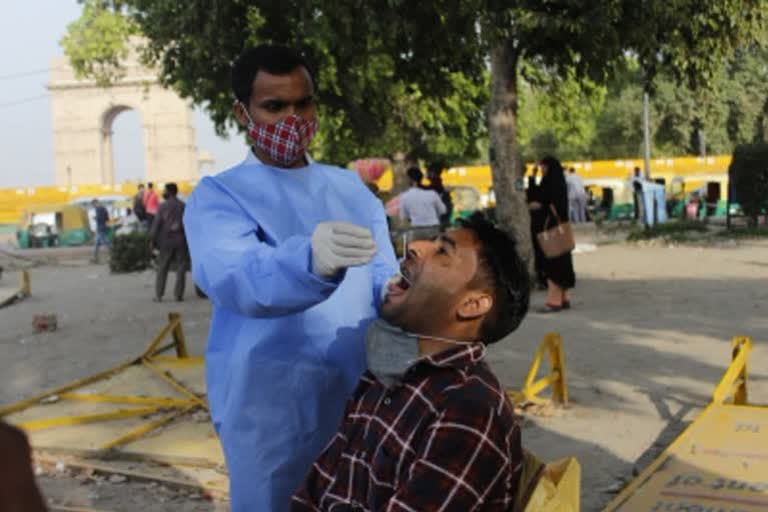New Delhi: Expressing grave concern over the recent surge of Covid19 cases, the Union Ministry of Health and Family Welfare (MoHFW) on Wednesday asked all state and UTs to impose local restrictions to contain the spike.
In a letter dashed to the chief secretaries and administrators of states and UTs, the health ministry further said that the battle against Covid19 is at a critical juncture, with the rising number of cases and deaths reported in many states and UTs in the recent past.
Referring to an order issued by the Union Home Ministry, the health ministry said that in view of upcoming festivals such as Holi, Shab-e-Barat, Bihu, Easter and Eid-ul-Fitr etc, it is strongly advised that states may consider imposing local restrictions in public observations of these festivals and limit as well as do away with mass gathering, in the exercise of power conferred under Section 22 of the Disaster Management Act, 2005.
The Delhi government Tuesday issued such restrictions on public gathering. The Health Ministry pointed out that states like Maharastra, Punjab, Gujarat, Madhya Pradesh, Karnataka and Tamil Nadu have been witnessing a recent surge in Covid cases.
READ: Salman Khan receives first dose of COVID-19 vaccine
Health Secretary Rajesh Bhusan told reporters in New Delhi that the spike in Maharastra and Punjab is a matter of grave concern.
"From 10,000 and more on March 7, Maharashtra has witnessed a spike of 28,699 cases today with Pune, Nagpur, Mumbai, Thane and Nashik being the five top districts with maximum cases," said Bhushan.
He said that the recent spike in Punjab is also a matter of grave concern. "States like Gujarat, Madhya Pradesh, Karnataka and Tamil Nadu too are showing recent surge...so wherever necessary local restrictions must be imposed," said Bhushan.
He informed that the health ministry has called for a review meeting with all these maximum caseload states on Saturday. "In this meeting, we will review the scenario and if necessary we will make New guidelines," added Dr Bhushan.
Referring to the increase of interval period of Covid19 vaccines in India, Bhushan said that it's only COVISHIELD whose interval period has been increased to 4-8 weeks. "Instead of the earlier interval of 4-6 weeks, the interval between two doses of COVISHIELD has been extended to 4-8 weeks. But the difference should not be later than 8 weeks," said Bhushan.
READ: Indian vaccines can fight UK and Brazil variants: ICMR
He, however, said that the time interval of two doses of COVAXIN remains the same (4-6 weeks). The official said that there are no restrictions on using COVISHIELD following reports that the vaccine creates a blood clot. "WHO had also recommended the use of COVISHIELD," said Bhushan.
Talking about the vaccination process, Bhushan said that the new protocol on Covid19 vaccination for all people above 45 years has been revised following the fact that people in this category contributes 88 per cent of the total Covid deaths in India.
"Case fatality rate for age group 45 years and above is 2.85 per cent. So, relaxation has been given to those people above 45 years of age," said Bhushan. The vaccination for people above 45 years of age without co-morbidities will start from April 1. He informed that as of Wednesday, a total of 5,08,41,286 Covid vaccine doses have been administered.
A total of 2,64,52,366 people above 60 years and people aged 45 years with co-morbidities have been vaccinated. He said that 79,17,521 health care workers (HCW) got 1st dose of vaccine and 50,20,695 health care workers got the second dose of vaccine.
READ: Putin gets jab of COVID-19 vaccine -- out of the public eye
As many as 83,62,065 frontline workers (FLW) got 1st dose of vaccine and 30,88,639 frontline workers got the second dose of vaccine.
"People should come forward to get vaccine doses so that we can strongly fight against the pandemic," added Bhushan.
The health secretary informed that 20 states and UTs like Kerala, Odisha, Lakshadweep among others have administered the first dose to more than 92 per cent of HCWs. 14 states and UTs including Nagaland, Lakshadweep, Rajashtan and others have administered a second dose to more than 85 per cent of the eligible HCWs.
Bhushan further informed that states like Telangana, Chandigarh, Nagaland and Punjab registered low vaccination coverage (62 to 65 per cent). The health secretary further appealed to states to use private facilities for vaccination administration.



